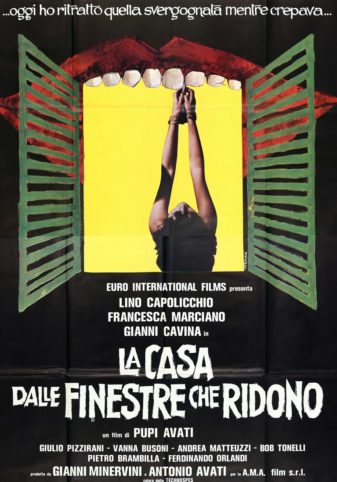 A striking, though imperfect, film from Pupi Avati, one of the Italian horror film industry’s least-known talents. THE HOUSE WITH LAUGHING WINDOWS boasts a compellingly low-key style, a refreshing change of pace in a genre known for its outrageousness, but it may be a shade too low-key for its own good.
A striking, though imperfect, film from Pupi Avati, one of the Italian horror film industry’s least-known talents. THE HOUSE WITH LAUGHING WINDOWS boasts a compellingly low-key style, a refreshing change of pace in a genre known for its outrageousness, but it may be a shade too low-key for its own good.
A striking, though imperfect, film from Pupi Avati, one of the Italian horror film industry’s least-known talents.
Pupi Avati began his career in the late sixties-early seventies period, directing a number of mostly forgettable horror comedies. He also made uncredited contributions to the scripts of films like Dario Argento’s DEEP RED and Pier Paolo Pasolini’s SALO (both 1975). His first notable self-directed production was THE HOUSE WITH LAUGHING WINDOWS (LA CASA DALLE FINESTRE CHE RIDONO) in 1976, which met with virtually no success. Avati wouldn’t direct another pure horror film until 1983’s effective ZEDER: VOICES FROM BEYOND, after which he defected to more mainstream fare.
If any one film could be said to embody Avati’s career-long obsessions, it would be THE HOUSE WITH LAUGHING WINDOWS. An excellent piece of film-making, it has nevertheless been somewhat over-rated by today’s genre critics, most notably Phil Hardy, who in his indispensable OVERLOOK FILM ENCYCLOPEDIA: HORROR dubs it the finest horror film of the seventies. Exceptional though I think it is, I don’t think I’d go that far.
Stefano, a painter, arrives at a secluded beachfront town to restore a crumbling church fresco. Almost from the moment he steps off the boat, Stefano is assailed by anonymous messages and phone calls warning him off the project. Undaunted, he stays on, learning more about the mysterious and depraved painter of the fresco, who apparently identified a little too closely with his violent and bloody art. It seems that the diabolical artist regularly employed his psychotic sisters to capture people from around the countryside and torture them, thus enabling him to get as realistic a picture as possible. Stefano begins to suspect that, while the painter himself is long gone, a victim of self-immolation, the two evil sisters may yet be around, still up to their murderous deeds…
It’s an extremely well told story, but one that, in order to fully appreciate its many twists, demands an unusual amount of attention. It pays off, of course, as the surprise ending is one of the most disturbingly effective in recent memory. More troubling are the characterizations, or more accurately lack thereof. Lino Caplicchio in the lead role is the least interesting person in the entire film, and his tepid love affair with the equally bland Francesca Marciano (not to mention an illicit fling he has early on that is never referred to again) does nothing to help matters.
It’s an extremely well told story, but one that, in order to fully appreciate its many twists, demands an unusual amount of attention.
An example of Pupi Avati’s inimitable style occurs in a scene set in an attic, an environment turned into a veritable chamber of horrors by just two elements: a wide angle lens and a sack swinging back and forth on a rope. The subjects of THE HOUSE WITH LAUGHING WINDOWS aren’t flesh and blood monsters, but the evils of the past, slowly permeating the present landscape. It’s this atmosphere that takes center stage over the standard graphic violence one usually finds in Italian horror movies, leaving an impression that lasts long after the final credits roll.
But as skilled as Avati’s pared-down approach is, at times one longs for the excesses of fellow countrymen like Dario Argento and Lucio Fulci. One has to question the purpose of a film whose ultimate effect doesn’t occur until after it ends…where exactly is the fun in that?
Vital Statistics
THE HOUSE WITH LAUGHING WINDOWS (LA CASA DALLE FINESTRE CHE RIDONO)
AMA Films
Director: Pupi Avati
Producer: Gianni Minervini, Antonio Avati
Screenplay: Pupi Avati, Antonio Avati, Gianni Cavina, Maurizio Costanzo
Cinematography: Pasquale Rachini
Editor: Giuseppe Baghdighani
Cast: Lino Capolicchio, Francesca Marciano, Gianni Cavuna, Giulio Pizzirani, Vanna Busoni, Andrea Matteuzzi, Bob Tonelli, Pietro Brambilla, Ferdinando Orlandi, Ines Ciaschetti
